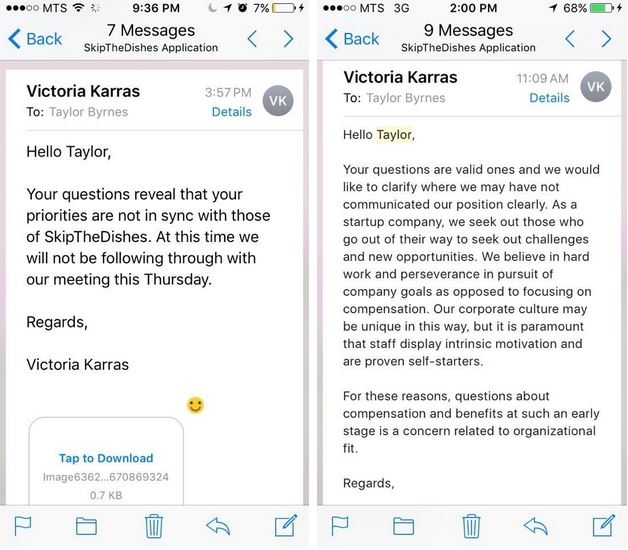Wells Fargo Blames a Manager
An investigation led by Wells Fargo's board into the practices that led to thousands of false accounts blames Carrie Tolstedt, the former head of the retail division:
The root cause of sales practice failures was the distortion of the Community Bank's sales culture and performance management system, which, when combined with aggressive sales management, created pressure on employees to sell unwanted or unneeded products to customers and, in some cases, to open unauthorized accounts.
The report also says the former CEO John Stumpf was "too slow" to investigate possible issues. The report is public on Wells Fargo's website.
Tolstedt's lawyers dispute the allegations. Stumpf once referred to Tolstedt as the "best banker in America." Reuters reported:
Tolstedt was perceived by high-level employees as having the support of Stumpf, with whom it was considered best to avoid raising problems with.
"Stumpf was ultimately responsible for enterprise risk management at Wells Fargo, but was not perceived within Wells Fargo as someone who wanted to hear bad news or deal with conflict," the report said.
Duke Law School Professor James Cox told Reuters, "There's a tremendous amount of pressure from regulators to throw someone under the bus. If they don't, then Wells Fargo is going to be even more in the crosshairs."
In a statement, "Wells Fargo Statement Regarding Board Investigation into the Community Bank's Retail Sales Practices," CEO and President Tim Sloan summarized actions the bank has taken: // <![CDATA[ // <![CDATA[ // <![CDATA[ // <![CDATA[ // if this line executes, then javascript is turned on and we'll therefore remove the no-js class from the HTML tag document.documentElement.className = document.documentElement.className.replace(/(^|\s)no-js(\s|$)/, '$1$2'); // ]]> // ]]> // ]]> // ]]</p></div>
New Facebook App for Spotting Fake News
 Facebook is launching a new app for spotting what the company is calling "false news and hoaxes." In a blog post titled "A New Educational Tool Against Misinformation," the company explains the new tool:
Facebook is launching a new app for spotting what the company is calling "false news and hoaxes." In a blog post titled "A New Educational Tool Against Misinformation," the company explains the new tool:
We know people want to see accurate information on Facebook – and so do we. False news and hoaxes are harmful to our community and make the world less informed. All of us have a responsibility to curb the spread of false news.
At Facebook we have been focusing on three key areas:
- disrupting economic incentives because most false news is financially motivated;
- building new products to curb the spread of false news; and
- helping people make more informed decisions when they encounter false news.
Facebook and Google has been under pressure to address the increasing number of offensive and incorrect posts on their sites. This is Facebook's latest strategy to take responsibility and address the criticism that such sites are not doing enough.
The tool offers the following advice:
1. Be skeptical of headlines. False news stories often have catchy headlines in all caps with exclamation points. If shocking claims in the headline sound unbelievable, they probably are.
2. Look closely at the URL. A phony or look-alike URL may be a warning sign of false news. Many false news sites mimic authentic news sources by making small changes to the URL. You can go to the site and compare the URL to established sources.
3. Investigate the source. Ensure that the story is written by a source that you trust with a reputation for accuracy. If the story comes from an unfamiliar organization, check their "About" section to learn more.
4. Watch for unusual formatting. Many false news sites have misspellings or awkward layouts. Read carefully if you see these signs.
5. Consider the photos. False news stories often contain manipulated images or videos. Sometimes the photo may be authentic, but taken out of context. You can search for the photo or image to verify where it came from.
6. Inspect the dates. False news stories may contain timelines that make no sense, or event dates that have been altered.
7. Check the evidence. Check the author's sources to confirm that they are accurate. Lack of evidence or reliance on unnamed experts may indicate a false news story.
8. Look at other reports. If no other news source is reporting the same story, it may indicate that the story is false. If the story is reported by multiple sources you trust, it's more likely to be true.
9. Is the story a joke? Sometimes false news stories can be hard to distinguish from humor or satire. Check whether the source is known for parody, and whether the story's details and tone suggest it may be just for fun.
10. Some stories are intentionally false. Think critically about the stories you read, and only share news that you know to be credible.
Discussion:
- To what extent do you think this will address the concerns about fake news?
- Which of the suggestions for spotting fake news do you find most and least helpful? Which are more obvious than others?
- What else, if anything, should Facebook do?
Penn State Trustee Resigns After Putting Foot in Mouth
Five or so years after the scandal at Penn State involving a football coach, young boys, and an inactive Administration, the university is still in the news for bad behavior. Former coach Jerry Sandusky was convicted of rape and child molestation and is serving prison time. You may remember that Joe Paterno was also accused of cover-ups, but he died of cancer soon after the scandal broke and he was dismissed from the university.
Last week, the former university president, Graham Spanier, was convicted of child endangerment. FBI director Louis Freeh wrote in a report that for more than 12 years, Spanier and other Administrators, "actively protected a notorious pedophile who inflicted irreparable harm on countless child victims on the campuses and locker rooms at PSU. Although these men had multiple opportunities to stop this vicious, serial predator from continuing to sexually assault children who trusted the PSU campuses and programs as safe havens, they decided together to protect this monster rather than report him to the police."
After the verdict, one of the Penn State trustees, Albert L. Lord, said, "Running out of sympathy for 35 yr old, so-called victims with 7 digit net worth," and "Do not understand why they were so prominent in trial. As you learned, Graham Spanier never knew Sandusky abused anyone."
Lord has since resigned from the board, and it's unclear whether he was asked to leave. He also issued an apology statement.
Discussion:
- If the board of trustees didn't ask Lord to resign, should they have?
- Analyze Lord's statement. How well does this work to explain the comment, apologize, and rebuild Penn State's image?
Trouble for Pepsi's Kendall Jenner Ad
 Backlash is fierce after a Pepsi commercial featuring Kendall Jenner, Caitlyn Jenner's daughter. Critics say it's disrespectful of important issues today and mocks activism. The short version of the commercial, now unavailable, shows Jenner at a photo shoot, smiling at a man, throwing off her blond wig, wiping off her lipstick, grabbing a Pepsi, giving it to a police officer, and then joining the cheering crowds.
Backlash is fierce after a Pepsi commercial featuring Kendall Jenner, Caitlyn Jenner's daughter. Critics say it's disrespectful of important issues today and mocks activism. The short version of the commercial, now unavailable, shows Jenner at a photo shoot, smiling at a man, throwing off her blond wig, wiping off her lipstick, grabbing a Pepsi, giving it to a police officer, and then joining the cheering crowds.
The description on the YouTube video reads,
A short film about the moments when we decide to let go, choose to act, follow our passion and nothing holds us back. Capturing the spirit and actions of those people that jump in to every moment and featuring multiple lives, stories and emotional connections that show passion, joy, unbound and uninhibited moments. No matter the occasion, big or small, these are the moments that make us feel alive.
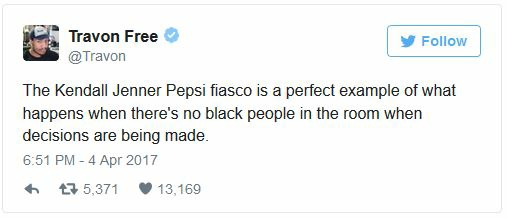 Tweeters criticize the simplification of complex issues, with one tweeting, "Can't believe Kendall Jenner just solved institutionalized racism and oppression by giving a cop a Pepsi. Groundbreaking."
Tweeters criticize the simplification of complex issues, with one tweeting, "Can't believe Kendall Jenner just solved institutionalized racism and oppression by giving a cop a Pepsi. Groundbreaking."
Pepsi is making no apologies: "This is a global ad that reflects people from different walks of life coming together in a spirit of harmony, and we think that's an important message to convey."
UPDATE: Pepsi decided to pull the ad and issued this statement: "Pepsi was trying to project a global message of unity, peace and understanding. Clearly we missed the mark, and we apologize. We did not intend to make light of any serious issue. We are removing the content and halting any further rollout. We also apologize for putting Kendall Jenner in this position."
Discussion:
- What's your reaction to the ad? What was Pepsi trying to do, and where did the ad fall short?
- Should Pepsi apologize? If so, what should the company say?
- Did the company do the right thing in pulling the ad? Why or why not?
Google Steps Up Ad Policies
 Google's Alphabet group is responding to criticism of offensive ads by tightening its ad policies. Last week, AT&T, Johnson & Johnson, and other companies, concerned about "brand safety," pulled ads from YouTube because they were appearing next to hate speech.
Google's Alphabet group is responding to criticism of offensive ads by tightening its ad policies. Last week, AT&T, Johnson & Johnson, and other companies, concerned about "brand safety," pulled ads from YouTube because they were appearing next to hate speech.
Bloomberg reports harsh words from industry leaders about Google and Facebook:
In a speech last week, Robert Thomson, Chief Executive Officer of News Corp., a frequent Google critic, said the two digital companies "have prospered mightily by peddling a flat earth philosophy that doesn't wish to distinguish between the fake and real because they make copious amounts of money from both."
Bloomberg also reports that Google has sophisticated artificial intelligence (AI) technology to fight "dangerous and derogatory" ads, but "[a]utomatically classifying entire videos, then flagging and filtering content is a more difficult, expensive research endeavor -- one that Google hasn't focused on much, until now." However, in the past two weeks, the company has flagged or disabled five times the number of videos than it had previously. Google Chief Business Officer Philipp Schindler is minimizing the issue, but he does admit it's a problem:
But it's five [times] on the smallest denominator you can imagine. Although it has historically it has been a very small, small problem. We can make it an even smaller, smaller, smaller problem.
These latest changes seem to be better received than ones introduced two weeks prior. At least after this announcement, no more advertisers have pulled ads-so far.
Discussion:
- Schindler's quote reminds me of former BP CEO Tony Hayward reference to the oil spill in the Gulf of Mexico as "tiny." Is this a fair comparison? What differences do you see in the two situations?
- Does Google's AI push give you more confidence in its ability to prevent offensive ads? Why or why not?
- Why didn't the company focus on this earlier, and why is it so actively working on this issue now?
Infographic Gets Panned on Twitter
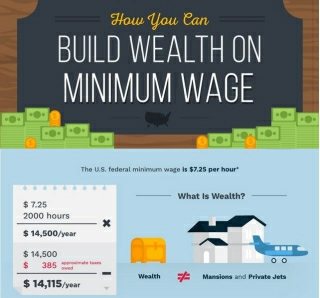 InvestmentZen, which encourages financial independence, created an infographic with advice for living on minimum wage, currently $7.25 per hour. Suggestions include selling your car, moving to a less expensive city, and recognizing that "a lot of the best things in life are free."
InvestmentZen, which encourages financial independence, created an infographic with advice for living on minimum wage, currently $7.25 per hour. Suggestions include selling your car, moving to a less expensive city, and recognizing that "a lot of the best things in life are free."
Reactions are generally not positive. Twitter users are taking offense at some of the advice, pointing out that, for example, not everyone has the flexibility to move across country. Part of the infographic identifies "excuses" for not moving, including "All of my friends and family live here." Sounds like a good reason to stay put to me, particularly for people living in poverty or close to it.
Others on the Twitter thread note the missing expenses of moving, doing laundry, and children should anyone choose to have them. An obvious logical flaw is in suggesting people sell their car, yet suggesting picking up some Uber shifts.
This reminds me (and others) of a 2013 McDonald's website with advice to employees, including getting a second job. To help employees manage expenses, the site showed a sample monthly budget with $25 for health insurance. McDonald's pulled the site and published this statement:
We have offered the McResource program to help our valued McDonald's employees with work and life guidance created by independent third party experts. A combination of factors has led us to re-evaluate, and we've directed the vendor to take down the website. Between links to irrelevant or outdated information, along with outside groups taking elements out of context, this created unwarranted scrutiny and inappropriate commentary. None of this helps our McDonald's team members. We'll continue to provide service to our folks through an internal telephone help line, which is how the majority of employees access the McResource services.
Discussion:
- Analyze the full infographic. What visual and organizational design principles from Chapter 9 in the text are used?
- What other logical flaws can you identify?
- Overall, do you find the advice useful, or does it enrage you as it does some Twitter users? Should InvestmentZen pull the infographic and issue a statement as McDonald's did in 2013?
Richard Branson's Letter About Virgin America
 Richard Branson wrote an open letter lamenting the end of Virgin America. Alaska Air Group purchased the company in 2016 and, only three months later, decided to retire the brand. An Alaska Air official said, "We are going to be able to create a real, strong, integrated airline for travelers on the West Coast." Brandon says, "It has a very different business model and sadly, it could not find a way to maintain its own brand and that of Virgin America."
Richard Branson wrote an open letter lamenting the end of Virgin America. Alaska Air Group purchased the company in 2016 and, only three months later, decided to retire the brand. An Alaska Air official said, "We are going to be able to create a real, strong, integrated airline for travelers on the West Coast." Brandon says, "It has a very different business model and sadly, it could not find a way to maintain its own brand and that of Virgin America."
Branson uses emotional language to describe the decision and the demise of Virgin Records:
With a lot of things in life, there is a point where we have to let go and appreciate the fact that we had this ride at all. Many years ago, I shed tears over selling my beloved Virgin Records for $1 billion, which we needed to fight off British Airways' Dirty Tricks campaign to try to put Virgin Atlantic out of business. Many tears are shed today, this time over Alaska Airlines' decision to buy and now retire Virgin America.
Branson compliments the airline's employees and customers and includes memories:
Every market was hard-won. The launch parties, the networking, the productivity on flights, the live concerts at 35,000 feet, the marriage proposals, the first in-flight wedding, the Oprah Skype to the plane!
As you might expect from a big personality like Branson, he ends the letter on a dramatic note:
George Harrison once said, "All Things Must Pass." This was the ride and love of a lifetime. I feel very lucky to have been on it with all of you. I'm told some people at Virgin America are calling today "the day the music died." It is a sad (and some would say baffling) day. But I'd like to assure them that the music never dies.
Discussion:
- Analyze Branson's letter. Who are the primary and secondary audiences? What are the communication objectives? What is the organizational strategy?
- Given your analysis, how well does the letter meet its objectives?
Ackman Apologizes for Valeant
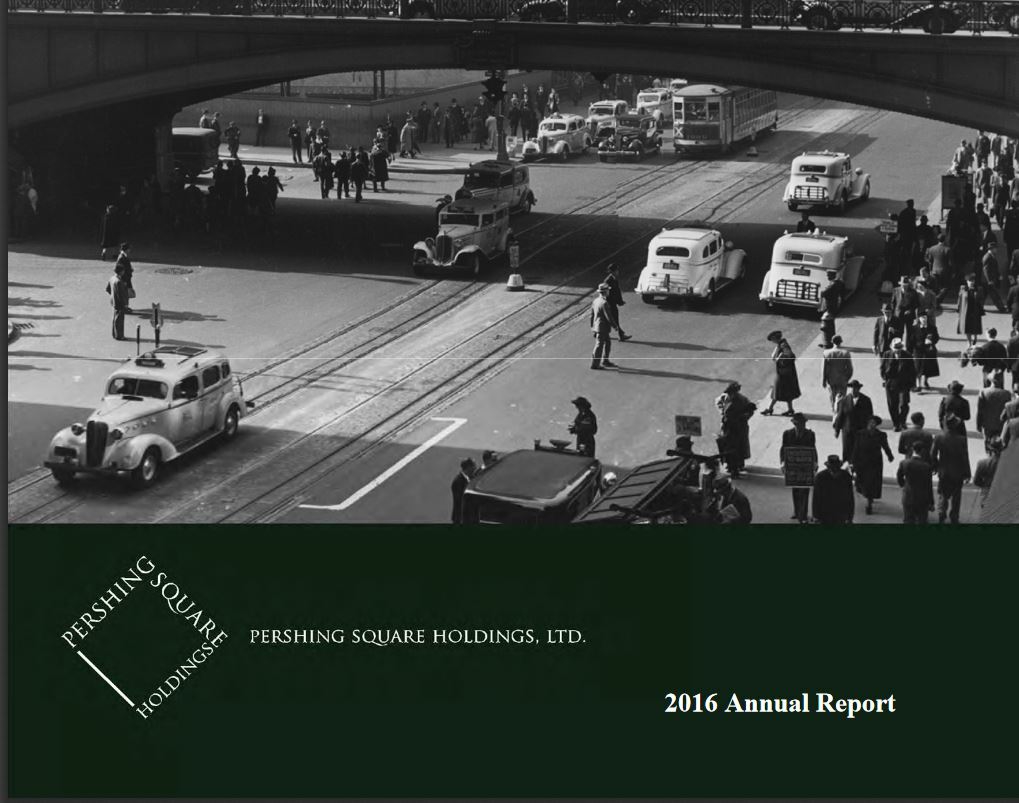 Activist investor and hedge fund manager William A. Ackman made a surprise apology for an investment in Valeant Pharmaceuticals that didn't turn out well. The New York Times reports on an annual letter sent to investors of the hedge fund, Pershing Square Capital Management:
Activist investor and hedge fund manager William A. Ackman made a surprise apology for an investment in Valeant Pharmaceuticals that didn't turn out well. The New York Times reports on an annual letter sent to investors of the hedge fund, Pershing Square Capital Management:
It is rare that William A. Ackman, the brash activist investor, apologizes for anything. As a successful hedge fund manager, Mr. Ackman has made billions of dollars for himself and his investors with bold and counterintuitive bets.
But this week he conceded that his firm's biggest wager yet - on Valeant Pharmaceuticals International - was "a huge mistake" that has cost his hedge fund firm, Pershing Square Capital Management, "a tremendous amount."
Valeant was in the news for drug price hikes, including a drug taken by AIDS patients that increased 5,500% in one day. The stock dropped from $257 in 2015 to $12.11, leaving Ackman's firm with a $4 billion loss.
Here are two significant quotations from the letter:
Clearly, our investment in Valeant was a huge mistake. The highly acquisitive nature of Valeant's business required flawless capital allocation and operational execution, and therefore, a larger than normal degree of reliance on management. In retrospect, we misjudged the prior management team and this contributed to our loss. We deeply regret this mistake, which has cost all of us a tremendous amount, and which has damaged the record of success of our firm.
"My approach to mistakes is that I personally assume 100 percent of the responsibility on behalf of the firm while sharing the credit for our success. While I and the rest of the Pershing Square team have suffered significant losses from this failed investment as we are collectively the largest investors in the funds, it is much more painful to lose our shareholders' money, and for this I deeply and profoundly apologize.
Discussion:
- Why do you think Ackman took this approach in his annual letter? Research the history of Valeant. Why didn't he apologize earlier?
- Read the entire letter. What is the context for the apology, and how well does it fit?
- What principles of an authentic apology, discussed in Chapter 7 of the book, does Ackman's apology demonstrate? Where does it fall short?
No, It's Not 'OK to Throw Rocks at Girls'
 Spicer Green Jewelers has apologized for a billboard that some think condones violence against women. The store in Asheville, NC, responded to the controversy in a TV interview and a social media post.
Spicer Green Jewelers has apologized for a billboard that some think condones violence against women. The store in Asheville, NC, responded to the controversy in a TV interview and a social media post.
In the interview, one of the owners said, "We are truly sorry that it offended anybody. That was certainly not our intention." Supporters on social media say the ad is funny and that others are over-reacting.
 In the Facebook post, the jewelers further explained the apology. A CNN article mentions that the company committed 10% of last week's sales to a local domestic violence organization.
In the Facebook post, the jewelers further explained the apology. A CNN article mentions that the company committed 10% of last week's sales to a local domestic violence organization.
Discussion:
- How well did the owners handle the situation in the TV interview and in the Facebook post?
- The decision to donate 10% of sales for a week seemed to come later. What's your view of this: a nice thing to do, an insignificant gesture, or something else?
Leggings Cause Trouble for United
Two teenage girls wearing leggings weren't allowed on a United Airlines flight. A passenger overheard the exchange, and you know the rest: cue the Twitter mob. Mentions of United went from an average of 2,000 to 174,000 (and no, it's still not true that "any publicity is good publicity"-in this case, 70% of the tweets were negative).
For some reason, celebrities got into the discussion too. Patricia Arquette, for example, tweeted, "@United. Leggings are business attire for 10 year olds [sic]. Their business is being children." (Isn't Arquette's business being an actress?)
What people didn't realize is that the girls were flying on free passes for family of United employees, and the company's policy includes a dress code for representatives of the airline. United explained the situation in a statement on its website.
Although American Airlines has a policy similar to United's, Delta asks passengers to use their "best judgment" when deciding what to wear. Delta took advantage of the situation with a sarcastic tweet.
Discussion:
- How well did United handle the situation? What points did the company emphasize in its statement?
- What's your view of Delta's tweet: clever, playful, schadenfroh (look it up), or something else?
Uber and Other Tech Companies' Diversity Stats
 After the scathing blog post about Uber's lack of diversity and issues with sexual harassment reporting, the company has published its diversity stats.
After the scathing blog post about Uber's lack of diversity and issues with sexual harassment reporting, the company has published its diversity stats.
Business Insider shows a series of bar charts comparing Uber's numbers to those of Facebook, Apple, Google, Twitter, and Microsoft. No companies are doing splendidly in terms of the percentage of women and people of color, but Uber is the least diverse in only one category: leadership. As the company reports, "Our leadership is more homogeneous than the rest of our employees. For example, no Black or Hispanic employees hold leadership positions in tech. This clearly has to change - a diversity of backgrounds and experience is important at every level."
 After additional criticism of CEO Travis Kalanick, he promises to take a more transparent approach: "This report is a first step in showing that diversity and inclusion is a priority at Uber. I know that we have been too slow in publishing our numbers - and that the best way to demonstrate our commitment to change is through transparency. And to make progress, it's important we measure what matters." Still, a Wall Street Journal article referred to Kalanick as "beleaguered": "Uber has said it is standing by its beleaguered founder." I wonder for how long that will continue.
After additional criticism of CEO Travis Kalanick, he promises to take a more transparent approach: "This report is a first step in showing that diversity and inclusion is a priority at Uber. I know that we have been too slow in publishing our numbers - and that the best way to demonstrate our commitment to change is through transparency. And to make progress, it's important we measure what matters." Still, a Wall Street Journal article referred to Kalanick as "beleaguered": "Uber has said it is standing by its beleaguered founder." I wonder for how long that will continue.
Discussion:
- Compare Uber to the other technology companies in Business Insider's charts. What conclusions do you draw?
- Compare Business Insider's bar charts to Uber's circle charts. Which work better and why? Why would each source choose the visual it did?
- How well does Uber explain its diversity position and goals on its website? What are the key messages you glean from this page?
Applicant Asks About Salary and Employer Cancels Interview

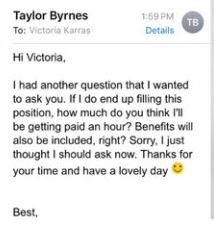 It was a tough lesson for Taylor Byrnes, looking for a menu developer position in Winnepeg. After a phone interview and before an in-person interview, she dared to ask her prospective employer, food delivery service SkipTheDishes, about wages and benefits. The company didn't appreciate the questions and cancelled the interview.
It was a tough lesson for Taylor Byrnes, looking for a menu developer position in Winnepeg. After a phone interview and before an in-person interview, she dared to ask her prospective employer, food delivery service SkipTheDishes, about wages and benefits. The company didn't appreciate the questions and cancelled the interview.
After the predictable outrage on Twitter, co-founder Joshua Simair said in a statement, "The email sent to Taylor was wrong and does not represent our team's approach or values," and "We are very disappointed in how it was handled. We do share a compensation package prior to hiring. As soon as we became aware of it on Monday, we reached out to Taylor to apologize for the email and reschedule her interview."
- Your thoughts? It typically is considered poor form to ask about salary on a first interview, but what about this situation? Did Byrnes behave badly? Did she make the situation worse with her posts on social media and therefore get what she deserved?
- How well did SkipTheDishes respond? Should they have done something else?
- Would you offer Byrnes the job if she's qualified? How easily can she and the HR staff get past this?
Sideways, Google's New Dictionary
 The Jigsaw incubator at Google Alphabet has created a dictionary to explain technical terms to the rest of us. Browser hijacking, cache, proxy, spoofing, tor-all are defined using simple analogies. Tor, for example, "Is like an onion. Tor stands for The Onion Router because it uses layer upon layer of protection to maximize anonymity. And trying to hack into it makes you cry."
The Jigsaw incubator at Google Alphabet has created a dictionary to explain technical terms to the rest of us. Browser hijacking, cache, proxy, spoofing, tor-all are defined using simple analogies. Tor, for example, "Is like an onion. Tor stands for The Onion Router because it uses layer upon layer of protection to maximize anonymity. And trying to hack into it makes you cry."
The site's About page explains, "It's like a dictionary, but using analogies instead of definitions. Use it as a tool for finding and sharing helpful analogies to explain technology. Because if everyone understands technology better, we can make technology work better for everyone."
The head of marketing for Jigsaw, Alfred Malmro, had the idea for Sideways when he was trying to explain the new division of Google: "I started comparing things. 'This tool is like an armored vehicle,' or ‘this one is like a seatbelt.' And suddenly they understand, well, I want to use the seatbelt but I'm not sure that I need an armored vehicle. It really needed real world comparison." Malmro also says, "It's about communicating safety as simply as possible to people."
Users can submit analogies. Moderators cull those that aren't accurate, but ultimately, users decide which are most useful to understanding.
Discussion:
- Read a few of the definitions. How helpful do you find the analogies?
- What are the potential dangers of this approach? Overall, do you like the idea?
Germany Proposes to Fine Companies for Illegal Content
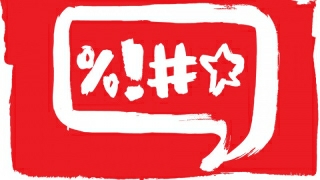 The German government wants to fine Google, Facebook, and other social media sites if they don't remove "hate speech, fake news and other undesirable content" within 24 hours if it's considered "blatantly illegal" and within seven days if it's otherwise considered to be breaking the law.
The German government wants to fine Google, Facebook, and other social media sites if they don't remove "hate speech, fake news and other undesirable content" within 24 hours if it's considered "blatantly illegal" and within seven days if it's otherwise considered to be breaking the law.
A Politico article describes the decision:
"Facebook and Twitter missed the chance to improve their takedown practices," said Heiko Maas, federal minister for justice and consumer protection. Maas claimed social media networks don't take complaints seriously. "For companies to take on their responsibility in question of deleting criminal content, we need legal regulations."
According to one study, Facebook removed 33% of illegal posts within 24 hours so far this year-not enough for some critics-and Twitter did worse, removing only 1% within 24 hours. The social media companies argue that policing negative activity is nearly impossible given the volume of posts on their sites.
In Twitter's defense (it needs one), the company has published extensive policies, including those related to "Hateful Conduct." But bullying, threats of violence, and other misconduct have been an issue for Twitter since the beginning and continue to plague the site's credibility.
In related hate-speech news, AT&T, Johnson & Johnson, and other big companies are pulling ads on YouTube because they don't want them appearing next to inappropriate content. This is another, perhaps more effective, way to get the social media sites to take action.
Discussion:
- What's your view of Germany's proposed law: reasonable, necessary, unrealistic, or something else?
- What effect do you think such a law would have on the social media sites? How about its users?
Another Million-Dollar Comma
 Or, in this case, a $10 million comma. Yes, it's another legal battle where meaning is questioned because of a comma-more precisely, a missing Oxford comma. Business communication students know it well: that last comma in a series your instructor encourages you to insert for clarity, even though most major newspapers don't use it, and your middle school teacher didn't make such a fuss about it.
Or, in this case, a $10 million comma. Yes, it's another legal battle where meaning is questioned because of a comma-more precisely, a missing Oxford comma. Business communication students know it well: that last comma in a series your instructor encourages you to insert for clarity, even though most major newspapers don't use it, and your middle school teacher didn't make such a fuss about it.
Truck drives for a dairy company, Maine-based Oakhurst Dairy, sued for $10 million in overtime pay because Maine's overtime statutes are unclear.
A Smithsonian news report summarizes the dispute related to F, "The canning, processing, freezing, drying, marketing, storing, packing for shipment or distribution of":
- Does this change your thinking about the Oxford comma, or do you still consider it a waste of time and space?
- What's your view of the court's ruling? Did the judge make the right decision? Why or why not?
Uber Loses President After Six Months
 Adding to Uber's trouble, President Jeff Jones resigned after only six months on the job, citing issues with the company. Reuters summarizes a statement submitted by Jones, who was previously the CMO for Target:
Adding to Uber's trouble, President Jeff Jones resigned after only six months on the job, citing issues with the company. Reuters summarizes a statement submitted by Jones, who was previously the CMO for Target:
"I joined Uber because of its mission, and the challenge to build global capabilities that would help the company mature and thrive long term," Jones said.
"It is now clear, however, that the beliefs and approach to leadership that have guided my career are inconsistent with what I saw and experienced at Uber, and I can no longer continue as president of the ride sharing business," he added. Jones wished the "thousands of amazing people at the company" well.
This is the sixth executive departure within the month. In an emailed statement, Uber wrote, "We want to thank Jeff for his six months at the company and wish him all the best."
This weekend, The New York Times Technology section reported that Bill Gurley, whose venture capital firm, Benchmark, owns 20% of Uber, is taking a more active role in the company. Gurley is known for warning start-ups about "excessive risk-taking." The Times also describes Gurley as "a rare figure, a Silicon Valley habitué who chides some of the biggest start-up stars to show some discipline and drop their arrogant behavior." It sounds like Uber will get some lessons in humility.
Discussion:
- Jones didn't have to say anything when he left. Why do you think he chose to handled the situation as he did? What were his other choices and the potential consequences?
- Uber's statement is short and sweet. Should the company have said something else?
- What does humility mean to you? Do you agree that Uber could use a dose?
Tillerson Had an Alias Email at Exxon
 New Secretary of State Rex Tillerson had an alias email address when he was CEO of Exxon and used it to discuss climate change issues. New York Attorney General Eric Schneiderman discovered the account-and 34 others-while investigating Tillerson on potentially misleading statements about climate change.
New Secretary of State Rex Tillerson had an alias email address when he was CEO of Exxon and used it to discuss climate change issues. New York Attorney General Eric Schneiderman discovered the account-and 34 others-while investigating Tillerson on potentially misleading statements about climate change.
Company spokesman Alan Jeffers says Tillerson did nothing wrong and set up the account because his primary email was overloaded:
"The email address, Wayne.Tracker@exxonmobil.com, is part of the company's email system and was put in place for secure and expedited communications between select senior company officials and the former chairman for a broad range of business-related topics."
"This was not an alias used to discuss only climate change. It was an account used for everyday business by senior executives who needed to reach."
Wayne is Tillerson's middle name, and Tracker may be relevant to his past involvement with the Boy Scouts of America.
Discussion:
- Do you believe Exxon's argument that nothing is wrong here? Why or why not?
- Should Exxon have disclosed the account during the lawsuit? They did reveal the email address but didn't connect it to Tillerson.
- If the company did create the account, and Tillerson used it for "confidential" conversations, why do you think Tillerson and Exxon thought they could get away with this: arrogance, niavety, desperation, or something else?
Monsanto Emails Reveal Company's Potential Influence over Cancer Studies
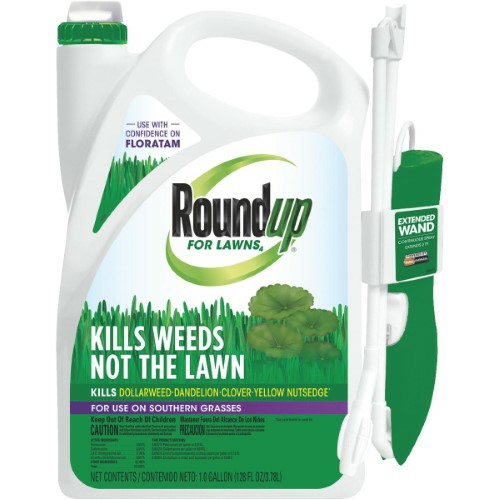 A key ingredient, glyphosate, in weedkiller Roundup may cause cancer, and emails from Monsanto employees put the company's role in cancer research into question. According to a Dow Jones news report, "Emails among company employees, released this week as part of a continuing lawsuit over the herbicide, reflect what the plaintiffs' attorneys say was the company's inappropriate role in shaping research and a cozy relationship with regulators at the U.S. Environmental Protection Agency. Monsanto argued the emails were taken out of context."
A key ingredient, glyphosate, in weedkiller Roundup may cause cancer, and emails from Monsanto employees put the company's role in cancer research into question. According to a Dow Jones news report, "Emails among company employees, released this week as part of a continuing lawsuit over the herbicide, reflect what the plaintiffs' attorneys say was the company's inappropriate role in shaping research and a cozy relationship with regulators at the U.S. Environmental Protection Agency. Monsanto argued the emails were taken out of context."
An EPA toxicologist, who had cancer, concluded that "it is essentially certain that glyphosate causes cancer." She wrote an impassioned letter to EPA Deputy Division Director Jess Rowland in 2013 highlighting the negative effects of the chemical.
Perhaps the most damning evidence is a Monsanto email summarizing a phone conversation with Rowland, which implies that the EPA is trying "kill" evidence of glyphosate causing cancer:
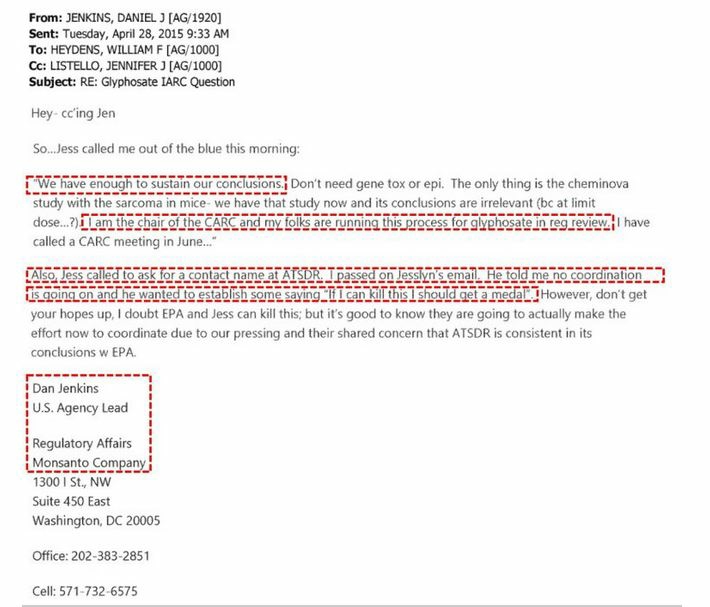
In addition, Monsanto's own lead toxicologist wrote in a 2009 email and confirmed in a recent deposition, "you cannot say that Roundup does not cause cancer … we have not done carcinogenicity studies with ‘Roundup.'"
Discussion:
- Once again, let's help companies avoid legal trouble with email. What should Monsanto have done differently?
- Of course, email isn't to blame, but the company and EPA may be. What went wrong here?
Disney Won't Cut the Gay Scene
 A gay scene in the new Disney "Beauty and the Beast" movie is causing a stir in other countries. The movie won't be shown in Malaysia because the company refuses to cut a three-second scene showing two male characters dancing together. A member of the censorship board said, "It is in our guidelines that we don't allow L.G.B.T. activity in movies in Malaysia. They are the ones not allowing the movie to be shown. We approved it with a minor cut."
A gay scene in the new Disney "Beauty and the Beast" movie is causing a stir in other countries. The movie won't be shown in Malaysia because the company refuses to cut a three-second scene showing two male characters dancing together. A member of the censorship board said, "It is in our guidelines that we don't allow L.G.B.T. activity in movies in Malaysia. They are the ones not allowing the movie to be shown. We approved it with a minor cut."
Director Bill Condon called the interaction "a nice, exclusively gay moment," and Disney made a short statement about the controversy: "The film has not been and will not be cut for Malaysia."
Officials in other countries aren't happy about the scene either. A Russian lawmaker said it was a "blatant, shameless propaganda of sin," and although the country will show the movie, only those 16 years or older can see it.
Condon said of the characters: "LeFou is somebody who on one day wants to be Gaston and on another day wants to kiss Gaston. He's confused about what he wants. It's somebody who's just realizing that he has these feelings."
Discussion:
- What do you think of Disney's choice to include two men dancing in a movie?
- Should Disney cut the scene so the movie would be shown in Malaysia? If it makes a difference in your answer (does it?), The New York Times reports, "'The Jungle Book' last year had $967 million in global ticket sales, and Malaysia represented $5.7 million of that total."
- How do you assess Disney's short statement in response? Should the company say more? Why or why not?
NYSEG Email and Reality
 NYSEG was preparing for the worst and trying to inspire customer confidence and stave off complaints. The NY gas and electric company sent email the day before the snow storm was expected to hit to tell us, "We're Prepared!"
NYSEG was preparing for the worst and trying to inspire customer confidence and stave off complaints. The NY gas and electric company sent email the day before the snow storm was expected to hit to tell us, "We're Prepared!"
Anticipating outages, NYSEG told us to contact "Outage Central" on its website. The main point of the email seems to be to tell customers how to report an outage-presumably to avoid a flood of phone calls that NYSEG can't handle.
Meanwhile, about 100,000 people are without power, and Twitter is abuzz with calls for NYSEG to do something other than "assess" the situation. Some are calling for an investigation into how NYSEG is handling outages.
@irenapapst tweeted, "... ithaca city schools were declared closed, and NYSEG sent out a pamphlet on storm preparedness. if other organizations were prepared ..."
Discussion:
- What's your view of NYSEG's pre-storm communications? Did this help or hurt the organization's reputation? What, if any, impact do you think the email and website had on storm outages?
- People are harsh towards NYSEG on Twitter. From what you observe, is it deserved? Could the organization do something different?


















